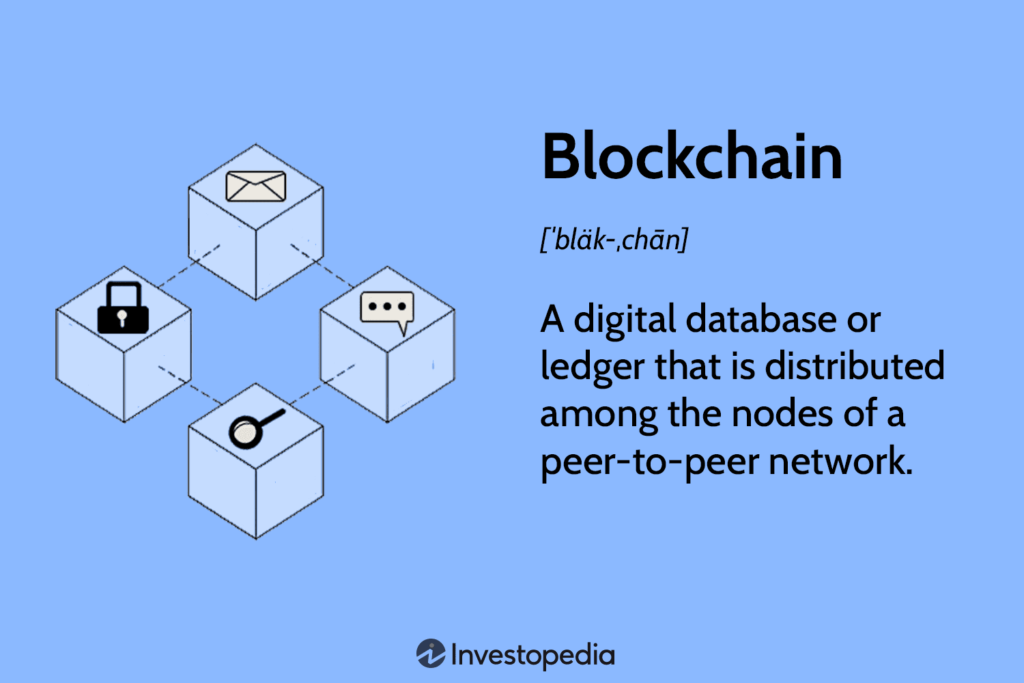Blockchain is a decentralized ledger technology that records transactions across multiple computers. It ensures security and transparency in data management.
Blockchain technology has revolutionized the way we think about data storage and transaction processing. By allowing digital information to be distributed but not copied, it has created the backbone of a new type of internet. Initially devised for the digital currency, Bitcoin, the tech community is now finding other potential uses for the technology.
Blockchain’s robust security comes from its ability to create immutable records of transactions, which are then time-stamped and linked to the previous one. This chain of data blocks is virtually impossible to alter without detection, thus fostering trust in the system. Its impact is far-reaching, with applications ranging from finance and healthcare to supply chain management and beyond. As industries continue to explore its benefits, blockchain stands poised to redefine digital transactions and data integrity in an increasingly digital world.
The Dawn Of Blockchain Technology
Imagine a world where transactions are safe, transparent, and fast. That’s the promise of blockchain. This technology began as the backbone of cryptocurrencies. Now, it’s transforming how we handle digital interactions. Let’s explore the roots and key principles of blockchain.
Origins Of Decentralized Ledgers
Blockchain’s history is as fascinating as its technology. It started with the need for secure online transactions. Early systems faced trust issues. The solution? A system where no single entity had control.
Bitcoin introduced the first real-world blockchain in 2009. It showed that decentralized security was possible. Now, countless industries are adopting this groundbreaking technology.
Key Principles Behind Blockchain
- Decentralization: Instead of one server or company in charge, many computers hold the data.
- Transparency: Everyone can see the transactions. This openness builds trust among users.
- Immutability: Once data is in the blockchain, no one can change it. This ensures history remains unaltered.
- Security: Advanced cryptography protects data. This makes hacking or fraud extremely difficult.
Together, these principles create a reliable and revolutionary system. They pave the way for a future where digital integrity is paramount.

Credit: online.stanford.edu
Disrupting Traditional Finance
The digital revolution is reshaping finance. Blockchain technology stands at the forefront. It brings innovative solutions, challenging how traditional banking operates.
Impact On Banking
Blockchain introduces a new framework for banking. Banks face a change or be outpaced scenario. This technology ensures secure transactions without intermediaries.
- Faster transactions: Blockchain reduces processing times from days to minutes.
- Lower costs: It cuts out middlemen, slashing fees significantly.
- Improved security: Decentralization and encryption make fraud and theft harder.
Cryptocurrencies Vs. Fiat Money
The debate between cryptocurrencies and fiat money is heating up. Cryptocurrencies gain popularity for their innovative traits.
| Cryptocurrencies | Fiat Money |
|---|---|
| Decentralized | Government-issued |
| Limited supply | Unlimited printing |
| Blockchain-based | No digital ledger |
Digital currencies bring transparency and efficiency. They hold the potential to become the new standard in finance.
Smart Contracts And Decentralized Applications
Blockchain technology unlocks a new era of digital agreements with smart contracts and decentralized applications (dApps). These tools change how we interact online. They offer secure, automated transactions without middlemen. Let’s dive into how they work and why they matter.
Automating Trust
Smart contracts are like digital promises that execute automatically. They are codes living on the blockchain. These contracts trigger actions when conditions meet. Think of them as vending machines. You select a snack, pay, and the machine delivers. No shopkeeper needed.
Trust is key in deals. Smart contracts provide this by being tamper-proof and transparent. Users see the rules and outcomes. No one can change the contract once it’s live. This builds a strong trust base in digital dealings.
The Rise Of Dapps
dApps are applications that run on a decentralized network. Unlike normal apps, they don’t rely on a single server or company. They are open and run by many people worldwide.
- dApps are unstoppable. Once live, they keep running.
- They are open to anyone. You don’t need permission to use them.
- Privacy is better as no single entity controls the data.
dApps have various uses, from games to finance. They are gaining popularity fast. This is because they give power back to users. They also offer new ways for creators to make and share content.

Credit: www.forbes.com
Investing In The Blockchain Space
Investing in the Blockchain Space is an exciting opportunity. This technology is changing how we think about data and transactions. Let’s explore the different ways to invest in blockchain and understand the potential risks and rewards.
Types Of Blockchain Investments
- Cryptocurrencies: Digital coins like Bitcoin and Ethereum are popular choices.
- Blockchain startups: Investing in new companies that are building blockchain applications.
- Blockchain ETFs: These are funds that invest in blockchain-related stocks.
- Blockchain stocks: Buying shares of companies that use or develop blockchain technology.
Risks And Rewards
Investing in blockchain can be profitable but comes with risks.
| Risks | Rewards |
|---|---|
| High volatility | Potential for high returns |
| Regulatory changes | Early adoption advantage |
| Market uncertainty | Access to new technologies |
Before investing, research and understand these factors. This helps you make informed decisions.
Initial Coin Offerings (icos) And Tokenomics
The digital world buzzes with new ways to secure funding and understand value. Initial Coin Offerings, or ICOs, and Tokenomics stand at the forefront of this digital finance revolution. Let’s dive into the details of how ICOs work and the intricate economy of tokens.
Understanding Icos
Initial Coin Offerings (ICOs) are a popular method for new cryptocurrency projects to raise funds. They offer a unique way for investors to get early access to a new coin before it hits the market. Think of an ICO as a mix between crowdfunding and an initial public offering (IPO).
- Creators announce a project and issue a limited amount of new tokens.
- Investors buy these tokens, betting on the project’s future success.
- Projects gain capital to develop their platforms or services.
ICOs are risky, but they can be very rewarding. They have helped launch some of the most successful blockchain platforms today.
The Economy Of Tokens
Tokenomics involves the design and economics of a token within its ecosystem. It is a blend of ‘token’ and ‘economics’. The goal is to make sure the token has a purpose and maintains its value over time.
| Aspect | Importance |
|---|---|
| Supply | Defines scarcity and value. |
| Demand | Drives interest and price. |
| Utility | Ensures usefulness within the ecosystem. |
| Distribution | Affects how tokens are spread among users. |
By understanding tokenomics, investors can make informed decisions. They can predict how a token might perform in the market. A well-designed economy promotes growth and stability for both the token and the project it supports.
Regulation And Compliance
Blockchain technology reshapes industries, promising greater transparency and security. Yet, its rapid growth calls for clear regulation and compliance measures. Establishing rules ensures its safe and ethical use. Let’s dive into how governments and international bodies navigate this terrain.
Government Perspectives
Countries recognize blockchain’s potential. They aim to support innovation while protecting citizens. Rules vary widely, reflecting unique economic and political climates. Some encourage growth, others tread cautiously. The focus is on consumer protection, anti-money laundering (AML) and anti-fraud measures.
Global Regulatory Landscape
Blockchain regulation is a global puzzle. Each country contributes a piece. Nations collaborate for a coherent framework. The aim is a balance between innovation and regulatory standards. Key areas include cryptocurrency trading, initial coin offerings (ICOs), and smart contract protocols.
The Financial Action Task Force (FATF) sets international standards. They focus on combating money laundering and terrorism financing. The FATF’s guidelines influence national policies. They ensure a united front against financial crimes.
| Region | Approach | Key Focus Areas |
|---|---|---|
| European Union | Comprehensive Strategy | Consumer Protection, Market Stability |
| United States | State-level Variance | Securities Law, Taxation |
| Asia-Pacific | Innovation Friendly | AML Policies, Cross-border Collaboration |
- EU: Markets in Crypto-Assets (MiCA) proposal aims for a unified regulatory framework.
- US: Agencies like the SEC and CFTC work on clarifications around digital assets.
- Asia: Countries like Singapore and Japan lead with clear regulations, fostering a secure blockchain environment.
In conclusion, blockchain’s promise requires a foundation of trust and legal clarity. Regulations evolve, aiming to protect while promoting growth. The journey towards a standardized global framework continues.
Blockchain In Various Industries
Blockchain technology is transforming many industries. It improves security, increases transparency, and enhances efficiency. Let’s explore how blockchain is making a big impact in healthcare, supply chain, and real estate.
Healthcare
Blockchain in healthcare promises to revolutionize patient data management. This technology offers secure access to medical records.
- Secure patient data: Blockchain creates unchangeable records. Doctors and patients can trust the data.
- Faster transactions: Blockchain speeds up billing processes. This reduces administrative costs.
Supply Chain
Blockchain provides real-time tracking of goods from production to delivery. This visibility is crucial for businesses.
| Benefit | Description |
|---|---|
| Transparency | Every step in the supply chain is visible. |
| Efficiency | Processes are faster, reducing time and cost. |
Real Estate
Blockchain technology is changing how we buy and sell property. It makes transactions more transparent and secure.
- Smart contracts: Automate buying and selling processes.
- Record keeping: Creates permanent histories of properties.
The Future Of Blockchain In Finance
The world of finance is on the brink of a revolution. Blockchain technology is at the forefront of this change. It promises to transform how we think about and handle money. From banks to everyday transactions, blockchain stands ready to provide solutions that are secure, transparent, and efficient. Let’s explore the future landscape of blockchain in the finance sector.
Predictions And Trends
Blockchain adoption in finance is skyrocketing. Experts predict a future where transactions are instant and borderless. Here are some trends to watch:
- Decentralized Finance (DeFi) will gain more traction, offering financial services to anyone with internet access.
- Cryptocurrencies will see broader acceptance as a payment method.
- Smart contracts will automate complex financial services, reducing the need for intermediaries.
- Tokenization of assets will enable fractional ownership and increase liquidity.
| Year | Trend |
|---|---|
| 2023 | Expansion of DeFi platforms |
| 2024 | Integration of crypto in payment systems |
| 2025 | Widespread use of smart contracts |
Preparing For Changes
Financial institutions must adapt to the evolving blockchain landscape. They must embrace new skills and strategies. Here’s how they can prepare:
- Invest in blockchain education and training for employees.
- Develop partnerships with blockchain technology providers.
- Explore pilot projects to test blockchain applications in a controlled environment.
- Stay updated with regulatory changes related to cryptocurrencies and blockchain technology.
These steps will ensure that businesses remain competitive and secure in the age of blockchain.

Credit: www.pwc.com
Frequently Asked Questions
What Exactly Is Blockchain?
Blockchain is a secure, decentralized digital ledger that records transactions across multiple computers, ensuring data integrity and transparency.
What Is A Blockchain For Beginners?
A blockchain is a digital ledger that securely records transactions across a network of computers, ensuring data integrity and decentralization.
What Is Blockchain Explained Very Simply?
Blockchain is a secure digital ledger that records transactions across multiple computers, ensuring no single record can be altered retroactively without altering all subsequent blocks.
What Are The 4 Types Of Blockchain?
The four types of blockchain are public, private, consortium, and hybrid blockchains, each offering different levels of access and control.
Conclusion
Blockchain technology is reshaping industries far and wide, from finance to healthcare. Its potential for enhancing transparency and security is unparalleled. As we continue to explore its applications, the impact on our daily lives could be profound. Embracing blockchain is not just about technology, but about paving the way for innovative, secure solutions for the future.

